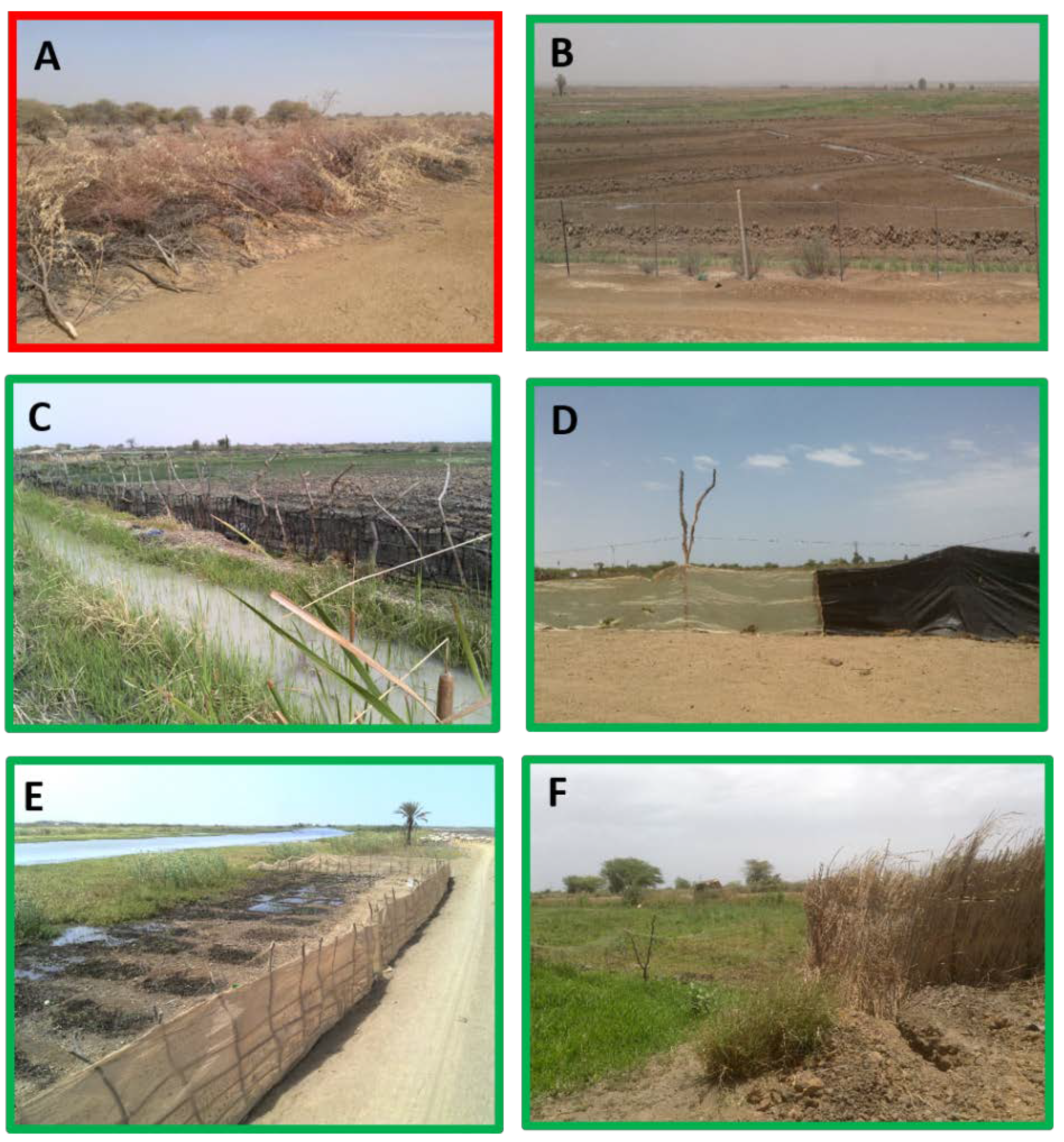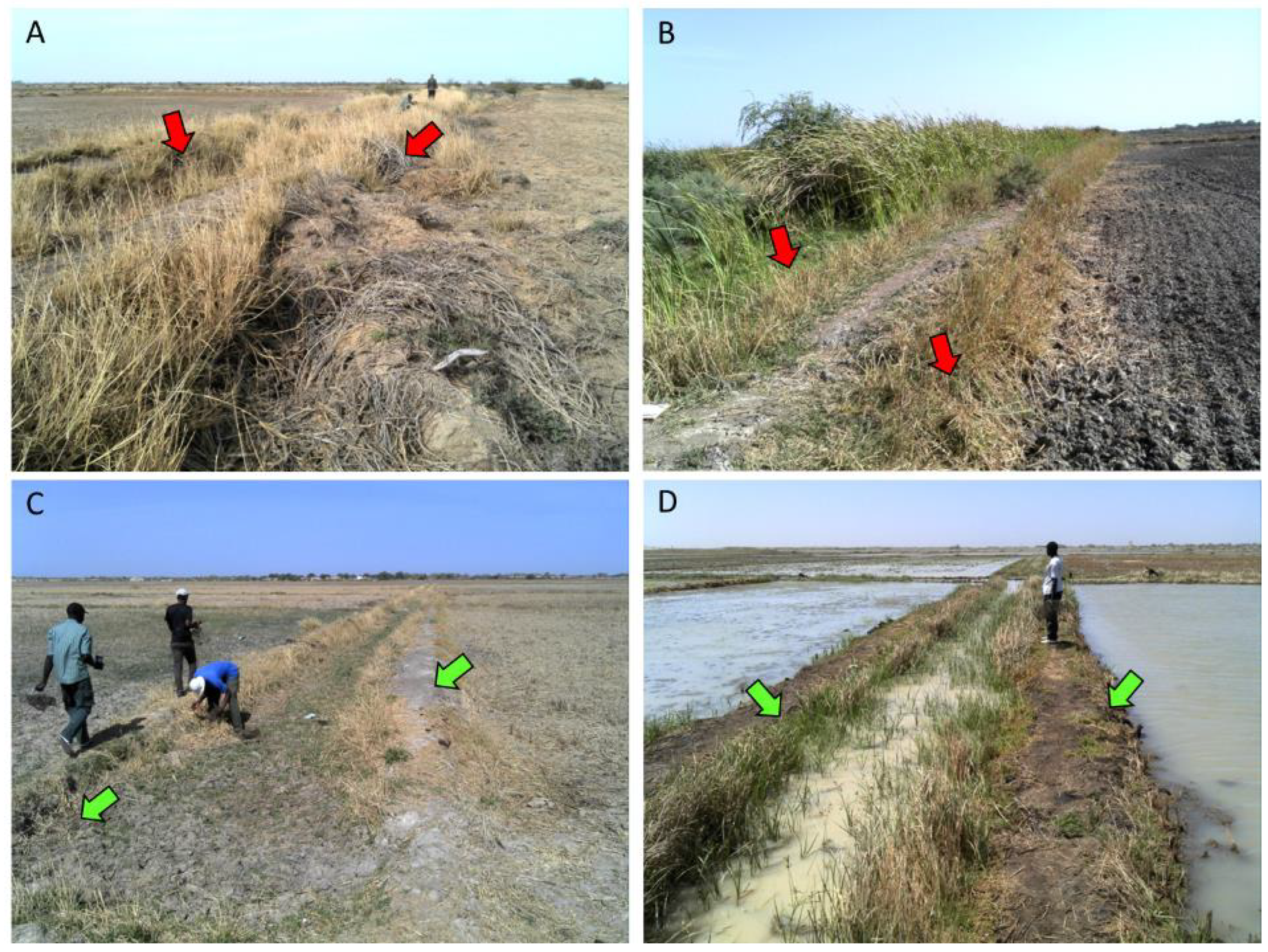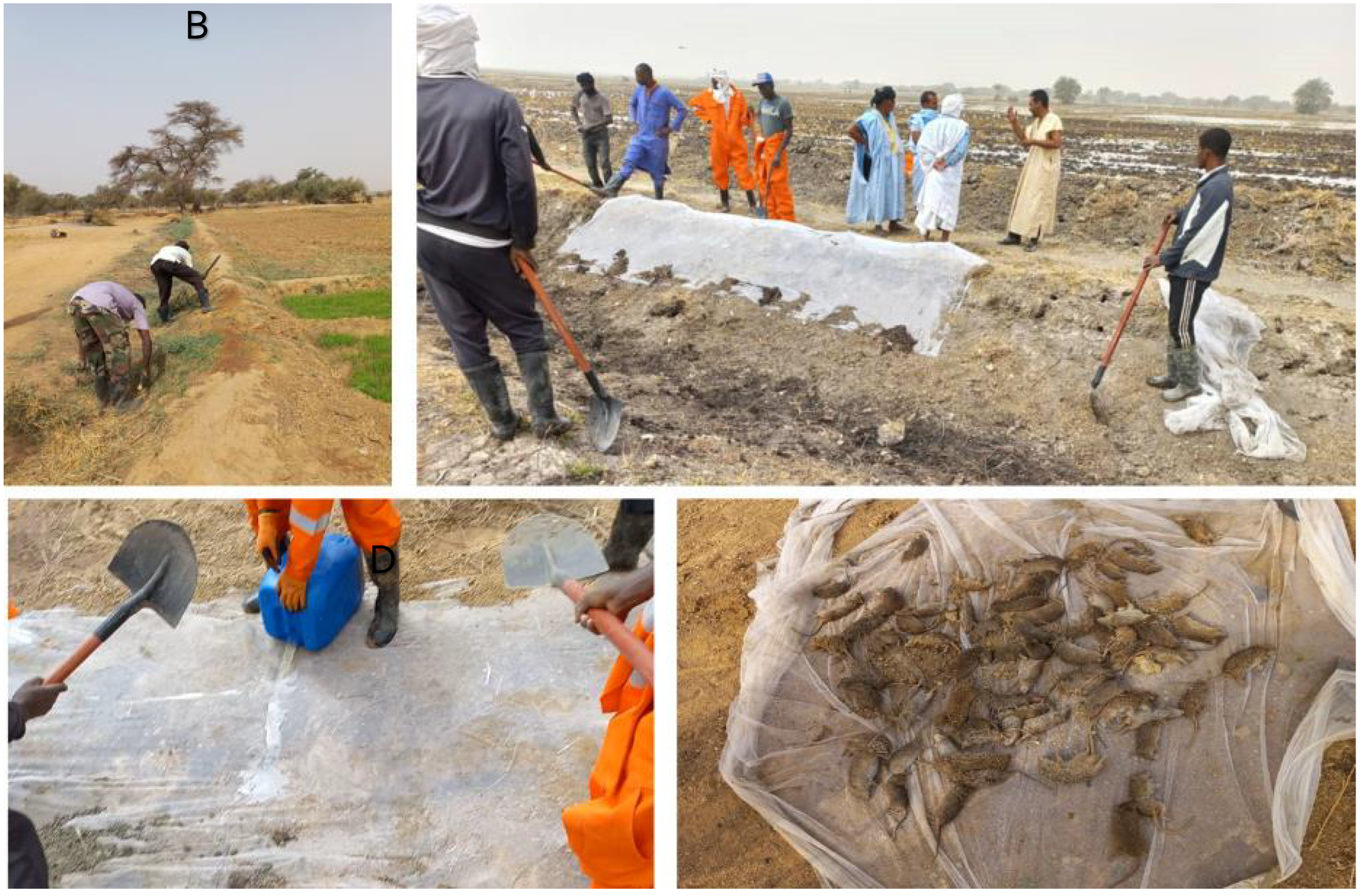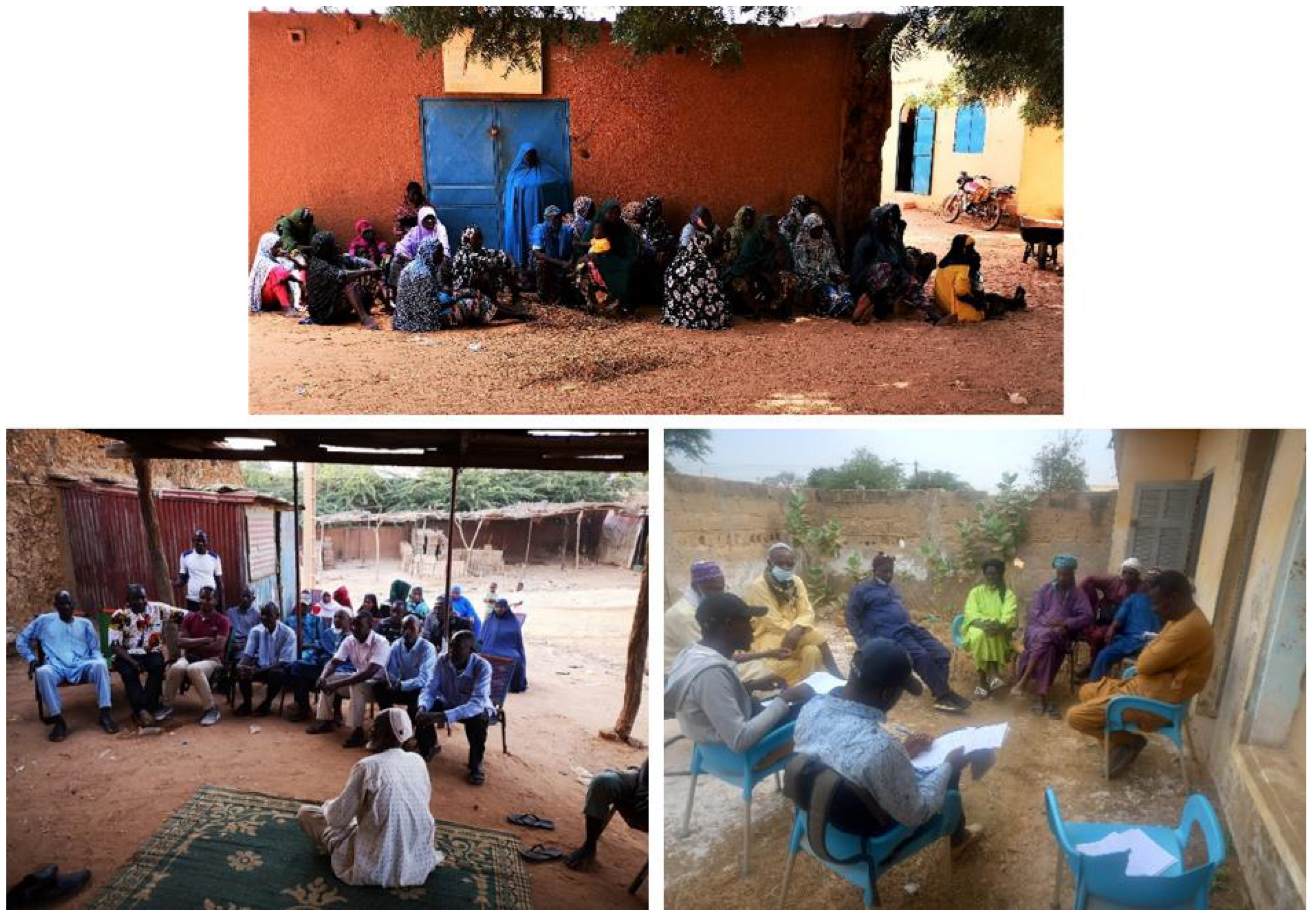Submitted:
26 April 2023
Posted:
27 April 2023
Read the latest preprint version here
Abstract
Keywords:
1. Ecologically-Based Rodent Management – an environment-friendly alternative to synthetic chemical rodenticides
2. EBRM in African cities and their immediate peripheries
3. EBRM in rural Africa, with special emphasis on Sahelian region
3.1. The Ethiopian EBRM experience
3.2. Opportunities for EBRM in Sahelo-Sudanian Western Africa
4. Conclusion
Supplementary Materials
Author Contributions
Funding
Acknowledgments
Conflicts of Interest
References
- Dalecky A, Garba M, Ibrahim Danzabarma AA, Etougbetche J, Badou S, Dossou HJ, et al. Rodent proliferation in urban and agricultural settings of sub-Saharan Africa – Part 1. The dark side of synthetic chemical rodenticides. Environnement, Risques & Santé. 2023; Accepted (Special issue from the conference “Mise en œuvre des politiques publiques et pesticides dans les Suds”).
- Singleton GR, Leirs H, Hinds LA, Zhang Z. Ecologically-based management of rodent pests–re-evaluating our approach to an old problem. Ecologically-based Management of Rodent Pests Australian Centre for International Agricultural Research (ACIAR), Canberra. 1999; 17-29.
- Singleton GR. Rodent outbreaks: ecology and impacts. Int. Rice Res. Inst.; 2010. 289 p.
- Palis FG, Singleton GR, Brown PR, Huan NH, Umali C, Nga NTD, et al. Can humans outsmart rodents? Learning to work collectively and strategically. Wildl Res. 2011; 38(7):568-78. https://www.publish.csiro.au/wr/WR10226. [CrossRef]
- Singleton GR. Ecologically-Based Rodent Management 15 Years On: A Pathway to Sustainable Agricultural Production. Proceedings of the Vertebrate Pest Conference. 2014; 26(26). https://escholarship.org/uc/item/2x69m0pf. [CrossRef]
- Rodent management and cereal production in Asia: Balancing food security and conservation. Pest Management Science 2021; 77:4249–4261. https://onlinelibrary.wiley.com/doi/10.1002/ps.6462. [CrossRef]
- Brown PR, Khamphoukeo K. Farmers’ knowledge, attitudes, and practices with respect to rodent management in the upland and lowland farming systems of the Lao People’s Democratic Republic. Integrative Zoology. 2007; 2(3):165-73. https://onlinelibrary.wiley.com/doi/abs/10.1111/j.1749-4877.2007.00055.x. [CrossRef]
- Ninh HN, Aragon C, Palis F, Rejesus R, Singleton G. Yield and Income Effects of Ecologically-based Rodent Management in Mekong River Delta, Vietnam. Journal of Contemporary Asia 2022; 13. [CrossRef]
- Belmain SR, Dlamini N, Eiseb S, Kirsten F, Mahlaba T, Makundi R, et al. The ECORAT project: developing ecologically-based rodent management for the southern African region. International Pest Control. 2008; 50(3):136-8. http://projects.nri.org/ecorat/docs/Int._Pest_Control.pdf.
- Taylor PJ, Arntzen L, Hayter M, Iles M, Frean J, Belmain S. Understanding and managing sanitary risks due to rodent zoonoses in an African city: beyond the Boston Model. Integrative Zoology. 2008; 3(1):38-50. https://onlinelibrary.wiley.com/doi/abs/10.1111/j.1749-4877.2008.00072.x. [CrossRef]
- Constant NL, Swanepoel LH, Williams ST, Soarimalala V, Goodman SM, Massawe AT, et al. Comparative assessment on rodent impacts and cultural perceptions of ecologically based rodent management in 3 Afro-Malagasy farming regions. Integrative Zoology. 2020; 15(6):578-94. https://onlinelibrary.wiley.com/doi/abs/10.1111/1749-4877.12447. [CrossRef]
- Makundi RH, Massawe AW. Ecologically based rodent management in Africa: potential and challenges. Wildl Res. 2011; 38(7):588-95. https://www.publish.csiro.au/wr/WR10147. [CrossRef]
- Habitat UN. October 6 World Habitat Day. Voices of slums. Background paper. 2014. 6 p.
- UN Habitat. World urbanization prospects: the 2018 revision. 2019. 126 p.
- Dalecky A, Bâ K, Piry S, Lippens C, Diagne CA, Kane M, et al. Range expansion of the invasive house mouse Mus musculus domesticus in Senegal, West Africa: a synthesis of trapping data over three decades, 1983–2014. Mammal Review. 2015; 45(3):176-90. https://onlinelibrary.wiley.com/doi/abs/10.1111/mam.12043. [CrossRef]
- Adebimpe WO. Community awareness and perception towards rodent control : implications for prevention and control of Lassa Fever in urban slums of South-Western Nigeria. Malta Journal of Health Sciences. 2015; 26-32. https://www.um.edu.mt/library/oar/handle/123456789/5051.
- Garba M, Kane M, Gagare S, Kadaoure I, Sidikou R, Rossi JP, et al. Local perception of rodent-associated problems in Sahelian urban areas: a survey in Niamey, Niger. Urban Ecosystems. 2014; 17(2):573-84. https://doi.org/10.1007/s11252-013-0336-x. [CrossRef]
- Dossou H, Le Guyader M, Gauthier P, Badou S, Etougbetche J, Houemenou G, et al. Fine-scale prevalence and genetic diversity of urban small mammal-borne pathogenic Leptospira in Africa: A spatiotemporal survey within Cotonou, Benin. Zoonoses and Public Health. 2022. https://onlinelibrary.wiley.com/doi/10.1111/zph.12953. [CrossRef]
- Odou SS. Nuisances des rongeurs à Cotonou: perceptions et organisations de la lutte par les habitants [License]. [Cotonou, Bénin]: EPAC, Université d’Abomey-Calavi; 2018.
- Sorel F, Armstrong. La lutte préventive contre la peste dans la circonscription de Dakar et dépendances durant l’année 1928. Annales de Médecine et de Pharmacie Coloniales. 1929; 27:64-72. https://www.biusante.parisdescartes.fr/histoire/medica/resultats/index.php?do=livre&cote=131132x1929x27.
- Cazanove F. Le problème du rat dans le territoire de Dakar et dépendances. Annales de Médecine et de Pharmacie Coloniales. 1932; 30:108-44. https://www.biusante.parisdescartes.fr/histoire/medica/resultats/index.php?do=livre&cote=131132x1932x30.
- Pertile AC, Lustosa R, Carvalho-Pereira T, Pedra GG, Panti-May JA, Oliveira U, et al. Evaluation of the impact of chemical control on the ecology of Rattus norvegicus of an urban community in Salvador, Brazil. PLoS ONE. 2022; 17(7):e0270568. [CrossRef]
- Awoniyi AM, Venegas-Vargas C, Souza FN, Zeppelini CG, Hacker KP, Carvalho-Pereira T, et al. Population dynamics of synanthropic rodents after a chemical and infrastructural intervention in an urban low-income community. Scientific Reports. 2022; 12(1):10109. [CrossRef]
- Tilahun T, Engdayehu G, Wondmnow B, Bosma L. Establishing Ecological Based Rodent Management in Ethiopia – Part 3: Collective implementation and ways forward. 2022. https://thewaterchannel.tv/thewaterblog/establishing-ecological-based-rodent-management-in-ethiopia-part-3-collective-implementation-and-ways-forward/.
- Rodent Green Management. EBRM campaigns in Amhara region. 2023. https://www.rodentgreen.com/case-studies/ebrm-campaigns-in-amhara-region/.
- Rodent Green Management. Bio-rodenticide. 2023. http://www.rodentgreen.com/bio-rodenticide/.
- TheWaterChannel. Bio-Rodenticide. 2023. https://thewaterchannel.tv/videos/bio-rodenticide/.
- Meheretu Y, Ashenafi F, Kidane D, Welegerima K. Stored-grain losses and management practices among smallholder cereal farmers in Northern Ethiopia. International Journal of Pest Management. 2022; 68(1):59-68. [CrossRef]
- AGRA. Africa Agriculture Status Report: The Business of Smallholder Agriculture in Sub-Saharan Africa. (Issue 5). Nairobi, Kenya: Alliance for a Green Revolution in Africa (AGRA); 2017. 180 p.
- Hima K, Granjon L, Gauthier P, Ndiaye A, Brouat C, Dobigny G. Population Dynamics and Genetics of Gerbillus nigeriae in Central Sahel: Implications for Rodent Pest Control. Ecology and Evolutionary Biology. 2019; 4(4):45. https://www.sciencepublishinggroup.com/journal/paperinfo?journalid=231&doi=10.11648/j.eeb.20190404.11. [CrossRef]
- Niang CT, Kane M, Niang Y, Sarr N, March L, Tatard C, et al. Socio-environmental changes and rodent populations in lowland agroecosystems of the lower delta of the River Senegal, West Africa: results of observations over a decade, 2008-2019. Journal of Vertebrate Biology. 2022;71:22015. [CrossRef]
- Giban J. Les rongeurs des cultures vivrières des régions du Niger. Inventaire des questions et projet d’un programme d’études en vue de la lutte [Internet]. Secrétariat d’état aux affaires étrangères chargé de la coopération & République du Mali; 1967. 43 p. http://vminfotron-dev.mpl.ird.fr:8080/masto2_2/infos/043.pdf.
- Bernard J. Les dégâts de rongeurs dans le bassin du fleuve Sénégal et dans d’autres régions de la République du Sénégal. Rome, Italie: OMVS, PNUD, FAO; 1976. 34 p.
- Fall MW. Rodent Control in Senegal: Present Problems, Future Needs [Internet]. Denver, Colorado, USA: Denver Wildlife Research Center; 1976. 31 p. https://pdf.usaid.gov/pdf_docs/PNAAG459.pdf.
- Duplantier JM. Rapport sur la mission au Sénégal effectuée du 30 mai au 6 juin 1987. Montpellier, France: ORSTOM; 1987. 5 p.
- Gramet P. Proposition d’un programme de lutte à court, moyen et long terme à l’encontre des vertébrés ravageurs (Rongeurs et Oiseaux). FAO, projet MAU/87/010; 1989. 38 p.
- Bori A, Dalecky A. Rapport d’évaluation de l’impact et des besoins en situation d’urgence à la suite de l’infestation des rongeurs au Sénégal et en Mauritanie en 2020-2021. Food and Agriculture Organization of the United Nations; 2021. 40 p. [CrossRef]
- Garba M, Abdellahi Tah OM, Breika K. Stratégie de gestion intégrée des rongeurs en Mauritanie. FAO; 2021. 18 p.
- Singleton GR, Sudarmaji, Brown PR. Comparison of different sizes of physical barriers for controlling the impact of the rice field rat, Rattus argentiventer, in rice crops in Indonesia. Crop Protection. 2003; 22(1):7-13. https://www.sciencedirect.com/science/article/pii/S0261219402000601. [CrossRef]
- Wang D, Li Q, Li K, Guo Y. Modified trap barrier system for the management of rodents in maize fields in Jilin Province, China. Crop Protection. 2017; 98:172-8. https://www.sciencedirect.com/science/article/pii/S0261219417300911. [CrossRef]
- Mulungu LS, Mchukya BM, Mnyone LL. Trap Barrier System (TBS) as a New Tool for Rodent Pest Management in Irrigated Rice in Africa. In: Pests Control and Acarology. IntechOpen; 2020. https://www.intechopen.com/chapters/undefined/state.item.id.
- Stuart AM, Kong P, Then R, Flor RJ, Sathya K. Tailor-made solutions to tackle rodent pests of rice through community-based management approaches in Cambodia. Crop Protection. 2020; 135:104717. https://www.sciencedirect.com/science/article/pii/S0261219419300249. [CrossRef]
- Baributsa D, Cristine M. Developments in the use of hermetic bags for grain storage. In: Advances in postharvest management of cereals and grains. Burleigh Dodds Science Publishing; 2020. p. 171-98.
- Baoua IB, Amadou L, Bakoye O, Baributsa D, Murdock LL. Triple bagging hermetic technology for post-harvest preservation of paddy rice Oryza sativa L. in the Sahel of West Africa. Journal of Stored Products Research. 2016; 68:73-9. https://www.sciencedirect.com/science/article/pii/S0022474X1630025X. [CrossRef]
- Williams SB, Baributsa D, Woloshuk C. Assessing Purdue Improved Crop Storage (PICS) bags to mitigate fungal growth and aflatoxin contamination. Journal of Stored Products Research. 2014; 59:190-6. https://www.sciencedirect.com/science/article/pii/S0022474X1400085X. [CrossRef]
- CERISE project - scientific information on invasive rodents in Senegal. 2018. http://projetcerise-ird-frb.fr & https://www.youtube.com/watch?v=sHH7F10oto4.
- Meheretu Y. Agriculture’s Rodent Problem. TheWaterChannel, Episode 9. Available online: https://soundcloud.com/user-622446535 (accessed on 12/01/2023).
- CERISE project - Theater play in local towns of Senegal. 2018. Available online: http://projetcerise-ird-frb.fr & https://www.youtube.com/watch?v=AQpJDKCdB4o&t=378s (accessed on 12/01/2023).
- Des Envahisseurs au Sahel / Invaders in the Sahel Available online: http://projetcerise-ird-frb.fr & https://www.youtube.com/watch?v=kC5r94LWiWU (accessed on 12/01/2023). 2018.
- Engdayeh G, Meheretu Y, Tilahun T, Wondmnow B, Bosma L, frank van S. Practical Guideline. Effectively Controlling Rats with Ecological Methods. Ethiopia edition 2020, Available online: https://metameta.nl/resources/manual-rodent-control (accessed on 12/01/2023) Ethiopia edition 2020.
- Rodent Green Management. Implementing Ecologically Based Rodent Management Available online: http://www.rodentgreen.com/ebrm/ (accessed on 12/01/2023).
- Comment contrôler les rongeurs - en français Available online: https://www.youtube.com/watch?v=uYB3pIuS1Fw (accessed on 12/01/2023). University of Greenwich 2016.





Disclaimer/Publisher’s Note: The statements, opinions and data contained in all publications are solely those of the individual author(s) and contributor(s) and not of MDPI and/or the editor(s). MDPI and/or the editor(s) disclaim responsibility for any injury to people or property resulting from any ideas, methods, instructions or products referred to in the content. |
© 2023 by the authors. Licensee MDPI, Basel, Switzerland. This article is an open access article distributed under the terms and conditions of the Creative Commons Attribution (CC BY) license (http://creativecommons.org/licenses/by/4.0/).




